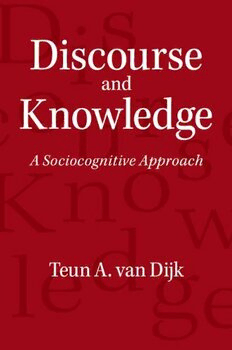Table Of ContentDiscourse and Knowledge
M ost of our knowledge is acquired by discourse, and our ability to prod uce
and understand discourse is impossible without the activation of massive
amounts of knowledge of the world. Both “discourse” and “knowledge” are
fundamental concepts of the humanities and social sciences, but they are
often treated separately. Based on a theory of natural knowledge, the book
deals with the cognitive processes, social distribution, cultural differences
and the linguistic and discursive “management” of knowledge in interaction
and communication in epistemic communities. The i rst book to adopt a
multidisciplinary approach to studying the relationship between the two
concepts, Discourse and Knowledge introduces the new i eld of epistemic
discourse analysis. Using a wide range of examples to illustrate the theory,
it is essential reading for both students and academics interested in epistem-
ology, linguistics, discourse analysis, cognitive and social psychology, and
the social sciences.
TEUN A. VAN DIJK was professor at the University of Amsterdam until 2004
and then at the Universitat Pompeu Fabra, Barcelona, until his retirement
in 2014. For details of his previous publications, visit his website www.
discourses.org .
Discourse and Knowledge
A Sociocognitive Approach
Teun A. van Dijk
University Printing House, Cambridge CB2 8BS, United Kingdom
Cambridge University Press is part of the University of Cambridge.
It furthers the University’s mission by disseminating knowledge in the pursuit of
education, learning and research at the highest international levels of excellence.
www.cambridge.org
Information on this title: www.cambridge.org/9781107416550
© Teun A. van Dijk 2014
This publication is in copyright. Subject to statutory exception
and to the provisions of relevant collective licensing agreements,
no reproduction of any part may take place without the written
permission of Cambridge University Press.
First published 2014
Printed in the United Kingdom by Clays, St Ives plc
A catalogue record for this publication is available from the British Library
Library of Congress Cataloguing in Publication data
Dijk, Teun A. van, 1943–
Discourse and knowledge : a sociocognitive approach / Teun A. van Dijk.
pages cm
Includes bibliographical references and index.
ISBN 978-1-107-07124-7 (hardback) – ISBN 978-1-107-41655-0 (paperback)
1. Knowledge, Sociology of. 2. Discourse analysis. I. Title.
HM651.D55 2014
306.4′2–dc23
2014004089
ISBN 978-1-107-07124-7 Hardback
ISBN 978-1-107-41655-0 Paperback
Cambridge University Press has no responsibility for the persistence or accuracy of
URLs for external or third-party internet websites referred to in this publication,
and does not guarantee that any content on such websites is, or will remain,
accurate or appropriate.
Contents
List of i gures page vi
List of tables v ii
Acknowledgment v iii
1 Introduction 1
2 Elements of a theory of natural knowledge 14
3 Discourse, knowledge and cognition 45
4 Discourse, knowledge and social cognition 90
5 Discourse, knowledge and society 139
6 Discourse, knowledge and culture 167
7 Language, discourse and knowledge 222
8 Conclusions 310
References 3 29
Index 395
v
Figures
4.1 System of social beliefs page 96
4.2 System of social beliefs, and the integrated position of
social representations 105
7 .1 S chema of the structure of the information sources controlling
knowledge management in the current communicative event 267
vi
Tables
7.1 Schema of the knowledge–discourse interface in past and
current research page 223
7.2 Types of knowledge, representation and their social basis 225
7.3 Epistemic structures in discourse semantics 304
vii
Acknowledgment
Part of the research for this book has been made possible by a grant from
the Spanish Ministry of Economy and Competitiveness (MINECO) for pro-
ject No. FFI2008-00070 E pistemic Strategies in Discourse, Interaction and
Communication.
viii
1 Introduction
1.1 Aims
Just after Christmas in 2011, the British newspaper the Daily Telegraph pub-
lished the following routine news article on asylum seekers :
01 Taxpayer funding £100,000 a day for failed asylum seekers
02 The taxpayer is spending more than £100,000 a day to house
03 failed asylum seekers who have no right to be in the country.
04 By Tom Whitehead, Home Affairs Editor
05 8:00AM GMT 26 Dec 2011
06 The Home Ofi ce spent almost £40 million last year supporting
07 so-called “hard cases” – asylum seekers who have had their claims
08 rejected but cannot leave for one reason or another.
09 I t is usually because of unsafe conditions in their home country, a
10 medical condition or they have launched a judicial review on a legal
11 point in their case.
12 But in the meantime the taxpayer must fund their accommodation
13 and living allowances.
14 And the cost of the asylum system is growing after separate i gures
15 showed the number of asylum seekers who are still awaiting a deci-
16 sion and need accommodation increased in 2011.
17 S ir Andrew Green, chairman of Migration Watch UK, said: “This is
18 a measure of the lengths to which people will go to stay in Britain.
19 “ But in the end, if their cases fail they must leave or the credibility
20 of the whole system is completely undermined.”
21 U nder what is known as Section 4 support, asylum seekers who
22 have had their claim for shelter rejected but cannot currently return
23 home are given accommodation and living support. In the 12 months
24 up to September 2011, a total of 4,430 people were awarded such
25 support – the equivalent of 12 a day.
26 S ome of those will have since left the country but others may be
27 here indei nitely if their particular circumstances do not change.
1

